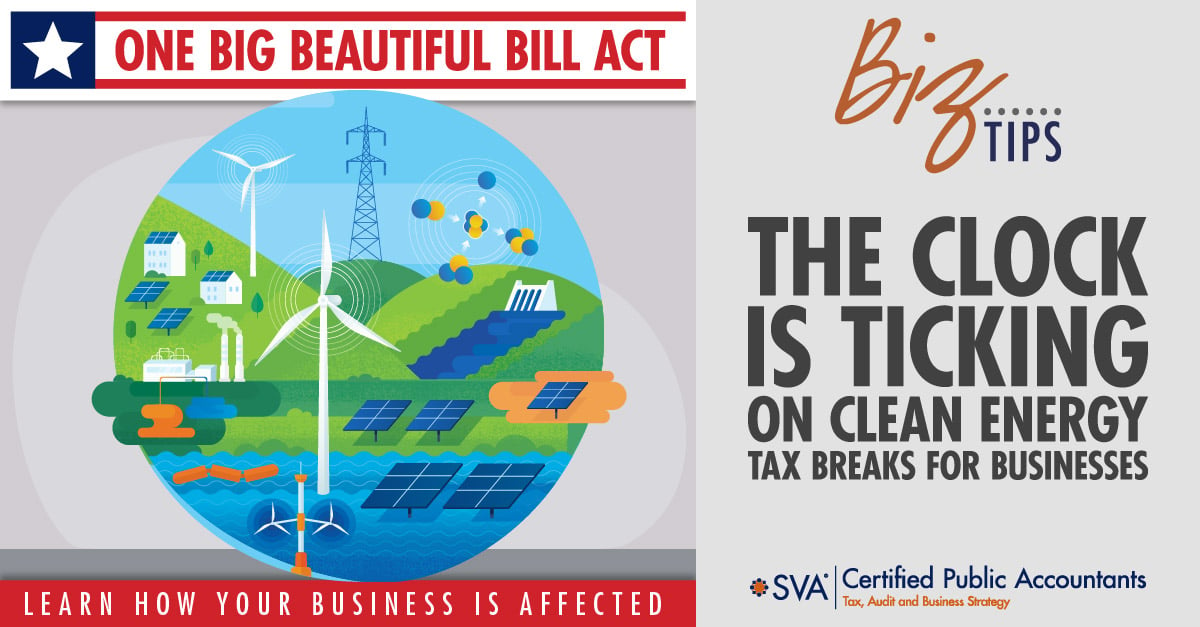| Highlights: |
- The article explains how the One Big Beautiful Bill Act (OBBBA) has accelerated the phase-out and elimination of several federal clean energy tax incentives that were previously available to businesses.
- It outlines specific deadlines for credits—such as clean vehicle, EV charging infrastructure, and energy-efficient building deductions—and how these changes shorten the window to act.
- The post encourages business owners to revisit capital plans, adjust project timelines, and consult tax advisors to capture remaining tax benefits before key cutoff dates arrive.
|
The One Big Beautiful Bill Act (OBBBA) makes sweeping changes to the tax code, and one area seeing a major rollback is clean energy incentives.
Several popular credits, many of which were set to run for several more years, are now sunsetting much sooner. That means business owners with energy-efficient upgrades on their to-do list may want to revisit their timelines.
Let’s walk through what’s changing, what it means for your business, and what actions are worth considering before key deadlines arrive.
(Download Video Transcript)
What's Going Away?
Several clean energy incentives are being eliminated or scaled back significantly under the new legislation:
1. Qualified Commercial Clean Vehicle Credit
Previously, businesses could receive a tax credit of up to $7,500 for purchasing qualifying new clean vehicles. Originally set to expire in 2032, the credit will now end for vehicles purchased after September 30, 2025.
For companies considering clean vehicle purchases for sustainability reasons or long-term fuel savings, this new cutoff accelerates decision-making. There’s now only a narrow window to act if you want to benefit from these credits.
2. Alternative Fuel Vehicle Refueling Property Credit
This credit supported businesses installing electric vehicle (EV) charging stations and other alternative fuel infrastructure. It’s also being eliminated early (terminating for property acquired after June 30, 2026) though it received less attention than the vehicle credits themselves.
Combined, this significantly reduces the financial incentives to adopt EV technology in commercial fleets or properties.
3. Section 179D Deduction for Energy-Efficient Commercial Buildings
Section 179D has long provided a deduction for businesses investing in energy-efficient commercial property, such as HVAC, lighting, or building envelope improvements. Depending on the scope of the upgrades and compliance with required standards, deductions could range from $0.50 to $5 per square foot.
Under OBBBA, the deduction is ending for any building that begins construction after June 30, 2026. While this provides a bit more runway than some of the other changes, that deadline still requires advance planning. “Breaking ground” is the key marker, so companies in the planning phase now should factor this into their construction timelines.
4. Clean Electricity Investment Credit
The Clean Electricity Investment Credit allows a business to claim a tax credit based on a percentage of its qualified investment in a zero-emission electricity generation facility or energy storage technology (such as solar panels, wind turbines, geothermal systems, or nuclear fuel cells) placed in service after December 31, 2024. The credit offers a base rate of 6% of qualified costs, which increases to 30% if certain prevailing wage and apprenticeship requirements are met.
Originally available through 2032 for all qualifying technologies, the credit was modified under OBBBA. For wind and solar, the credit now terminates for facilities placed in service after December 31, 2027, unless construction begins by July 4, 2026. All other technologies – such as geothermal, nuclear, and standalone energy storage – remain eligible under the original 2032 timeline.
What This Means for Business Owners
These changes don’t just reflect a shift in tax policy. They have real implications for capital investment decisions.
If your business had plans to electrify its fleet, install EV charging stations, retrofit facilities with energy-efficient improvements, or construct new energy-efficient commercial buildings, the value proposition may be shifting. With less financial incentive from the federal government, the long-term ROI on these investments could look different.
More urgently, business owners who already had these initiatives in motion or were planning to act in the next year or two now face time-sensitive decisions. Missing the window could mean leaving thousands in tax savings on the table.
What Should You Be Doing Now?
Here are some practical steps to consider:
| Revisit Your Capital Improvement Roadmap |
If energy-efficient upgrades were on your agenda, move up your timeline if possible. |
| Evaluate Your Vehicle Procurement Schedule |
If you're considering clean vehicles for your business, aim to purchase before the September 30, 2025 cutoff. |
| Talk With Your Contractor or Architect |
For commercial building projects, confirm your project is positioned to break ground before June 30, 2026 if you want to preserve eligibility for the Section 179D deduction. |
| Consult With Your Tax Advisor |
Every situation is unique. A quick conversation can help you assess whether accelerating a purchase or project makes sense given your overall strategy. |
Looking Ahead
While the rollback of clean energy tax incentives may be disappointing for some, especially those who’ve prioritized sustainability goals, there’s still time to take advantage of existing benefits – if you act soon.
If your business is weighing options or needs help adjusting plans, our team is here to help you sort through the details and make the most of what’s available.
© 2025 SVA Certified Public Accountants

